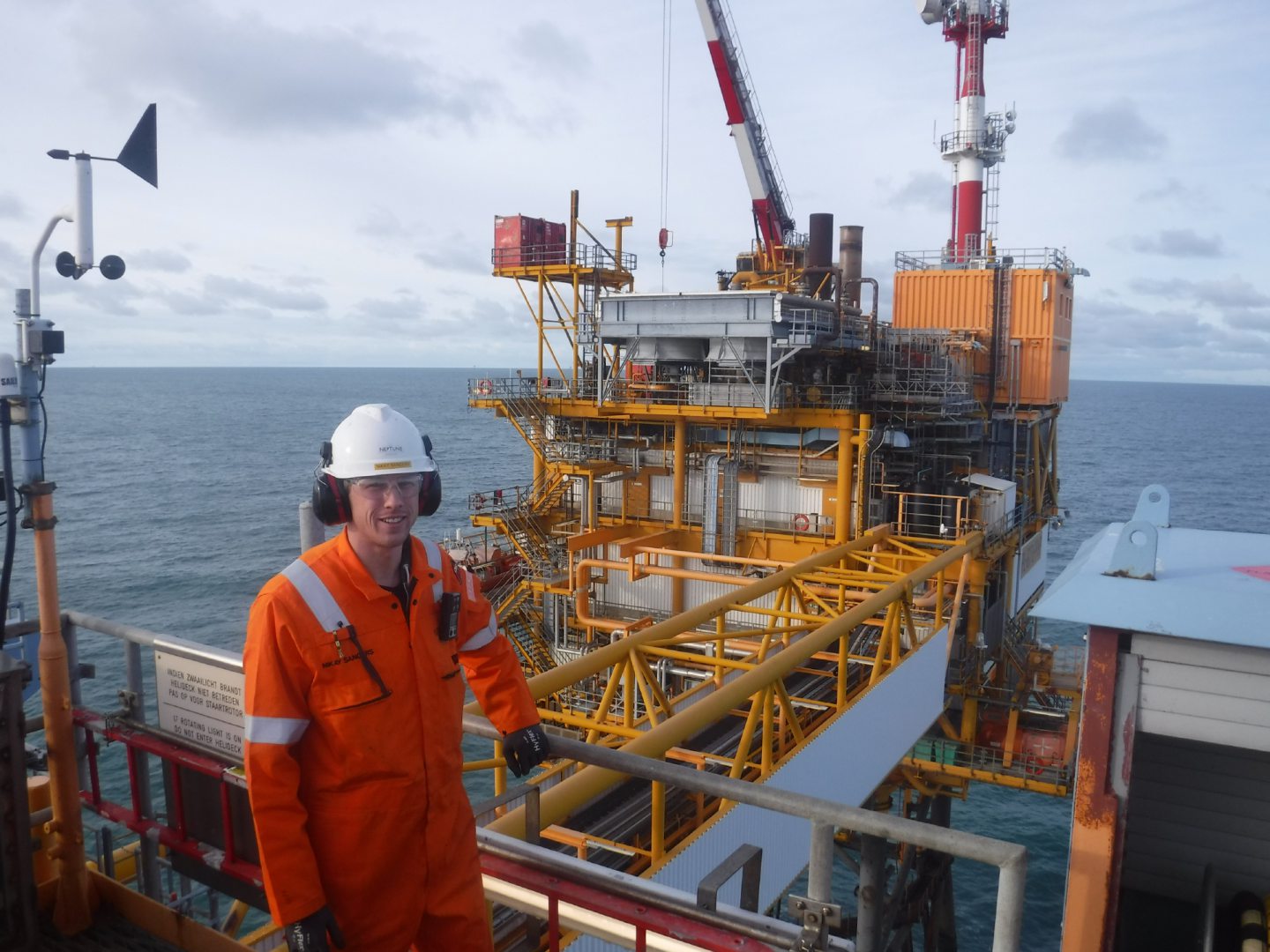
For a successful energy transition, the world needs the oil and gas industry, with its considerable financial clout, to weigh in.
The skills boasted by the sector are expected to unpin efforts to get carbon capture and storage, hydrogen and geothermal projects up and running at scale.
Much of the engineering prowess honed in the North Sea over the past 50 years can also be transferred smoothly over to offshore wind and marine power.
Unfortunately, many of these low-carbon projects aren’t shovel-ready yet, leaving the oil and gas sector needing to bridge some potentially troublesome years.
But the sector is already giving a younger generation of employees a range of opportunities to positively impact the energy transition.
As the months and years go by, and as companies’ strategies become reality, more opportunities will open up.
Swift progress, but a long way to go
BP’s Lucy Harper said the changes being made by the industry meant people who want to reduce the energy sector’s carbon footprint don’t have to make a straight choice between oil and gas and renewables.
Harper is environmental advisor on the huge Clair field, west of Shetland, where she is involved in identifying technologies which will help the firm get a better understanding of its emissions and, ultimately, reduce them.
She spent most of last year out on secondment at the BP division which supports offshore wind licensing rounds.
Last month, the company marked its entry into the UK offshore wind market when it was selected as the preferred bidder for two major leases in the East Irish Sea – Harper was the consenting manager on that project.
Environmental science may not be a natural path into oil and gas, but the Southampton University graduate was keen to work in some area of industry.
Harper, 29, is “more of a ‘doer’ than a thinker”. She wants to get up close to operations and see how things function.
Oil and gas appealed to Harper because it is “linked to so many mega trends and issues and is so critical to the way the world functions”.
BP was one of few companies to offer an environmental science graduate scheme.
In the seven and a half years since joining the company, she has witnessed and been part of big changes, especially since chief executive Bernard Looney launched a new net-zero strategy a year ago.
Harper recalled organising an event for BP’s North Sea workforce around the energy transition a couple of years ago.
“That was probably the first time a lot of the workforce had been engaged in the energy transition and how we’re going to reduce emissions,” she said.
“It’s funny to think about now because things have evolved so quickly in that space.
“It has been amazing to see how much BP has changed. Even in North Sea operations so much decision making is now based around the energy transition and net-zero.
“It has become a part of the business in a way that even I as an environmental advisor never thought it would.
“Being totally honest, we still have a ways to go. It’s going to take time, but I’m incredibly heartened that BP has stood up and said it is looking to change. It’s great to be part of that.”
Connor Robb, project manager at energy service firm Baker Hughes, also feels that his digital-oriented role puts him firmly in the energy transition mix.
The Aberdonian, crowned graduate of the year at the 2020 OGUK awards, said his employer was providing digital technologies that greatly reduced unplanned downtime, travel and inventory – all of which carry a hefty carbon footprint.
Robb, who is involved in the delivery of engageSubsea, an asset lifecycle management product, said: “We track the environmental benefit that our digital tools bring, and we can see that value increase every day.
“I truly believe digital is the catalyst in allowing our industry to get to net-zero and I am lucky enough to have a role at the centre of that.”
He said Baker Hughes was “nowhere near finished” in its endeavours and that he was looking forward to taking their offering “to the next level”.
Robb, who joined Baker Hughes as an apprentice, and went on to graduate as an engineer from Robert Gordon University, observed that clean energy wasn’t heard or talked about when he joined the industry, aged 16.
Now, the energy transition is something the entire industry talks about every day.
However, the 25-year-old acknowledges the sector could do more to tackle emissions in certain areas.
“Some organisations and bodies are doing great things and they’re doing them incredibly fast,” he said.
“I think we still have some work to do with what I call ‘indirect decarbonisation’ – where the carbon reduction of an event is purely coincidental, but is claimed as a benefit and marketed extensively.
“The true test is holding environmental impact alongside operational and financial KPIs and I’d like to see some organisations be bolder in that space.”
Nikay Sangers, 23, offshore operator/mechanic, at Neptune Energy, offshore Netherlands, said his employer — and the sector at large — is “actively” finding solutions to help reduce emissions from its operations.
Sangers said Neptune was exploring how it can reuse existing infrastructure to generate carbon-neutral energy, as shown by its PosHYdon pilot project for offshore green hydrogen production in the Dutch North Sea.
On an individual level, Sangers is part of the Young Energy Officers (YEO) programme, through which a group of young, Dutch oil and gas professionals engaging with policymakers, NGOs and media to discuss the dilemmas and challenges of the transition.
“I am working in an industry that is part of the energy transition and looking at its role in this,” he said. “I find it rewarding to be a part of the solution for the future as well.”
Crazy and foolish: Facing up to negative attitudes
Despite their noble intentions and ideas, there will always be those who view oil and gas companies and their employees as part of the problem.
As the energy transition debate gets louder, so too do those disapproving voices, which can lead to uncomfortable conversations.
Sangers said: “I once talked with an older man at a birthday party about my job and he told me I was crazy and foolish for choosing to work in the oil and gas sector and that I was part of the biggest problem that causes climate change.
“While I didn’t think the setting was appropriate to discuss this, I knew that I wanted to make a change and eventually this also made the choice of joining the YEOs very easy.
“I knew that working in the industry would allow me to be a part of the change and play a bigger role in the energy transition.”
Perhaps the best riposte to such attitudes is the also the most obvious one.
“We cannot have a safe, reliable, affordable energy system without gas right now,” Sangers reasoned.
“There are not enough sustainable alternatives that can replace the entire need for fossil fuels right now.
“At the same time, I see the shifts in the sector to take our responsibility seriously in moving towards having a CO2-neutral energy system in 2050 and that we are actively trying to find solutions to help us get there.”
Robb said: “I think oil and gas is an easy target for many people and I do find that unfair due to the positive impact that the industry has on the world.
“Of course, we need to become cleaner, we need to support a more diverse and sustainable energy mix.
“However, this industry underpins modern society and supports energy demand growth globally.
“It is important not to forget that and I’m always quick to remind people of that.”
Harper added: “Because I work in environmental space, I get exposure to other environmental professionals, which can be a help or a hindrance.
“It opens you up to lots of voices, but I’ve never met someone I’ve not been able to have a conversation with about (what I do and BP’s role in the energy transition).
“I’ve always had the mentality that I would rather be involved in trying to manage the issues associated with oil and gas than pretending they don’t exist.”
Downturns a ‘turnoff’
The industry does have more to worry about than critics who never intended to work constructively with oil and gas companies.
Young people who were considering careers in the sector must have witnessed the bloodletting of last year — and the downturn which began in 2014 — and question whether they should look elsewhere.
And those who recently joined the oil sector, only to be made redundant, will surely think long and hard before deciding whether they want to risk getting burned again.
Asked whether the latest downcycle will have put many young people off pursuing an oil and gas sector career, Robb said: “I’m sure it has. I know people who unfortunately lost their jobs in the last year, and a lot of them will not return to the industry – purely due to its cyclical nature and the uncertainty that comes with that.
“I hope that through the transition, the industry becomes less volatile and our technology development increases exponentially.
“It’s the only way to become the industry of choice for young talent.”
Harper, from Bristol, also knows of people who have moved out of oil and gas and into other industries during the downturn.
And she fears Covid’s impact on working practices could strip the oil and gas industry of another selling point — opportunities to travel and live in different places.
Harper recognises that everyone needs to do what’s right for them when it comes to choosing a career.
But if a person was in two minds about entering the oil and gas industry, her advice would simply be, “give it a try”.
She said: “In my time at BP I’ve had lots of amazing experiences and worked in lots of different jobs.
“It’s never static, it’s never boring. There are always opportunities to get involved in all sorts of different things, whether that’s renewables, remediation, projects, operations, volunteering or mentoring.”
Sangers is also certain that a lot of young people don’t want to work in the sector because of the negative perceptions surrounding it.
He is aware that a lot of people in his life don’t understand why he chose to work in the gas industry.
His explanation is that the sector is exciting, dynamic and gives employees opportunities to drive real change.
Sangers said: “I see a bright future ahead for our sector; a future where we help the energy transition move forward, and supply oil and gas in the cleanest, most efficient way possible where we do not have alternatives yet.”
Robb added: “This industry is going to go through unprecedented reinvention – the world needs it to – and the industry needs strong people to lead that change and to make a difference.
“Opportunities will arise faster than we have seen before and there is a real chance here to become the next energy leaders of the world.
“If you do join the sector, make us think differently, and stand over the ideas and values that you believe in.”
Recommended for you


 © Supplied by BP
© Supplied by BP © SYSTEM
© SYSTEM